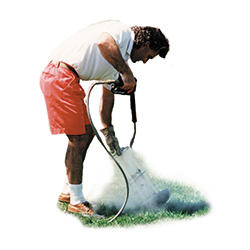Splish, Splash, Spray those Germs Away 
This time of year dead or sick birds seem to appear in our yards more frequently. The heat plays a negative impact on young or weak birds. Birds do not sweat and heed water to cool off. Be sure to offer water to combat theses high temperatures.
Some of our favorite bird species commonly visit bird feeders. These feeding stations may be an important factor in their well-being during some segments of their life cycle. However, poorly maintained feeding stations may contribute to the occurrence of infectious disease and mortality.
Often individuals who feed the birds do not receive complete and accurate information on bird disease or how to safely offer food and water to the birds. It is essential for those who enjoy the hobby of backyard birdfeeding to understand the importance of proper feeding methods to promote bird health. Keeping your birdfeeders clean may be important in reducing the spread of bird illnesses and diseases, including Conjunctivitis, Salmonellosis, and Aspergillosis.
This is a great time of year to assess your feeding stations to prevent or minimize problems at your feeders.
Give them space - Avoid crowding by providing ample feeder space., Crowding is a key factor in spreading disease. If birds have to jostle each other to reach the food, this creates stress, which may make birds more vulnerable to disease. This will reduce the birds' stress and the potential for disease transmission between healthy and sick birds.
Periodically, move feeders to new locations in the yard to avoid the build-up of waste materials and feces.
Clean up waste - Keep the feeder area clean of waste food and droppings. Always discard any seed that has become wet, moldy or foul smelling.
Make feeders safe - Provide safe feeders without sharp points or edges. Even small scratches and cuts will allow bacteria and viruses to infect otherwise healthy birds. Birdfeeders with cracks and crevices are difficult to sanitize and should not be used. Replace them with new feeders.
Keep feeders clean - Clean and disinfect feeders regularly. Clean with hot, soapy water, then use one part liquid chlorine household bleach in nine parts of tepid water (a 10% solution) to disinfect. Make enough solution to immerse an empty, cleaned feeder completely for two to three minutes. Allow to air dry.
Prevent contamination - Keep rodents out of stored food. Store all birdseed in rodent and insect proof containers to avoid contamination. Mice can carry and spread some bird diseases without being affected themselves.
Avoid handling sick birds and always wash our hands with soap and water after filling bird feeders.
Spread the word - Encourage your neighbors who feed birds to follow the same precautions. Birds normally move among feeders and can spread diseases as they go. The safest bird feeders will be those in communities where neighbors cooperate with equal concern for the health of the birds.
(Kathy, and her husband, John, own and operate Wild Birds Unlimited, located in Billings and at www.wbu.com/billings. She is a Certified Bird Feeding Specialist, holds a Bachelor's in Business from Rocky Mountain College, an MBA and an MMGT from University of Mary, and is past president of the Yellowstone Valley Audubon Society.)

